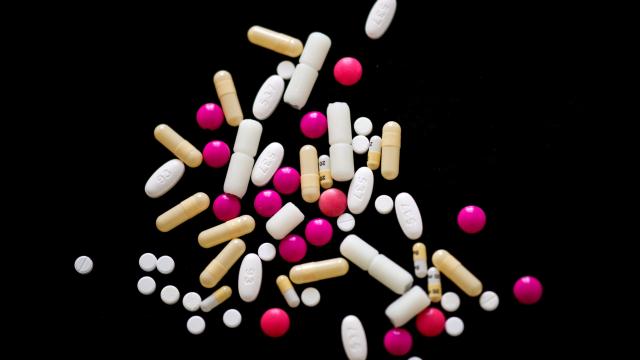Pharmaceutical giants celebrated the dawn of 2020 in the best way they know how: jacking up the prices of drugs for people in the U.S. that need them.
According to a report by Reuters, research by analysts at 3 Axis Advisors shows that firms including Pfizer Inc., GlaxoSmithKline PLC, Sanofi SA, Bristol-Myers Squibb Co., Gilead Sciences Inc., and Biogen Inc. have collectively raised U.S. prices on 250 drugs since the ball dropped on New Year’s Eve. The median price increase is around five per cent, Reuters wrote, while few of the drugs had price increases of 10 per cent or more.
Thousands of drugs saw price increases last year, according to analysis by Rx Savings Solutions, which found a 10.5 per cent average increase across 3,400 separate medications (that’s over five times the rate of inflation). Insurers and patients often avoid paying the full list prices of medication due to negotiated deals between manufacturers and buyers, though that’s far from certain to cover the costs, especially for the uninsured, those on insurance that refuses to cover certain drugs, or those on plans that increasingly charge percentage-based coinsurance instead of copays for prescriptions. (As Consumer Reports reported last year, insurers often calculate the percentage based on the list price of the drug rather than the negotiated price.)
A Kaiser Family Foundation survey last year found that 29 per cent of respondents had failed to take prescriptions as directed by medical personnel in the prior 12 months due to cost issues. As Reuters noted, the U.S.’s market pricing model for drugs means that they cost far more than in other nations with more government control (which has also made the U.S. the pharmaceutical industry’s single most lucrative nation).
Consolidation in the industry has also fuelled price increases because acquisitions can allow manufacturers to add new patent-protected drugs to their offerings as old patents expire. Manufacturers have tried to deflect the blame by saying the real issue is middlemen like pharmacy benefit managers, which handle price negotiations, and that after rebates and discounts net prices aren’t going up at the same rates that list prices are.
Price increases logged by Reuters include Bristol-Myers’ cancer immunotherapies Opdivo and Yervoy (1.5 per cent), blood thinner Eliquis (six per cent), and multiple myeloma drug Revlimid (six per cent). Gilead raised the price of HIV treatments Biktarvy and Truvada by less than five per cent, while Biogen raised the cost of multiple sclerosis treatment Tecfidera by six per cent, the 3 Axis report showed.
A separate analysis by Rx Savings Solutions noted that Pfizer raised the prices of over 90 drugs, including breast cancer drug Ibrance and rheumatoid arthritis treatment Xeljanz, according to the Wall Street Journal. It also raised the prices of generic injectables, such as heparins, a class of generic blood thinners (15 per cent). All told, Pfizer raised the prices of over 40 products by over nine per cent.
Compare that to the all items consumer price index, which the U.S. Bureau of Labour Statistics estimated in mid-December at about a 2.1 per cent increase over the past 12 months.
“Once you’re the sole manufacturer, you can do what you want…What is the status quo?” Oregon Health & Science University oncologist Vinay Prasad told NPR. “Unrelenting price increases with no downward pressure in a system that at some point cannot take it anymore and will collapse.”
“Prices go up but demand remains the same,” Rx Savings Solutions CEO Michael Rea told the Journal. “Without the appropriate checks and balances in place, this is a runaway train. Consumers, employers and health plans ultimately pay the very steep price.”
